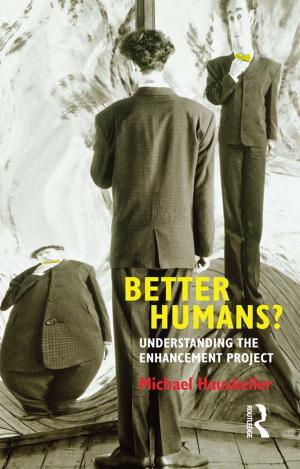Yiddish in Weimar Berlin
At the Crossroads of Diaspora Politics and Culture
Fiction & Literature, Literary Theory & Criticism| Author: | Gennady Estraikh | ISBN: | 9781351193658 |
| Publisher: | Taylor and Francis | Publication: | December 2, 2017 |
| Imprint: | Routledge | Language: | English |
| Author: | Gennady Estraikh |
| ISBN: | 9781351193658 |
| Publisher: | Taylor and Francis |
| Publication: | December 2, 2017 |
| Imprint: | Routledge |
| Language: | English |
"Berlin emerged from the First World War as a multicultural European capital of immigration from the former Russian Empire, and while many Russian emigres moved to France and other countries in the 1920s, a thriving east European Jewish community remained. Yiddish-speaking intellectuals and activists participated vigorously in German cultural and political debate. Multilingual Jewish journalists, writers, actors and artists, invigorated by the creative atmosphere of the city, formed an environment which facilitated exchange between the main centres of Yiddish culture: eastern Europe, North America and Soviet Russia. All this came to an end with the Nazi rise to power in 1933, but Berlin remained a vital presence in Jewish cultural memory, as is testified by the works of Sholem Asch, Israel Joshua Singer, Zalman Shneour, Moyshe Kulbak, Uri Zvi Grinberg and Meir Wiener. This volume includes contributions by an international team of leading scholars dealing with various aspects of history, arts and literature, which tell the dramatic story of Yiddish cultural life in Weimar Berlin as a case study in the modern European culture."
"Berlin emerged from the First World War as a multicultural European capital of immigration from the former Russian Empire, and while many Russian emigres moved to France and other countries in the 1920s, a thriving east European Jewish community remained. Yiddish-speaking intellectuals and activists participated vigorously in German cultural and political debate. Multilingual Jewish journalists, writers, actors and artists, invigorated by the creative atmosphere of the city, formed an environment which facilitated exchange between the main centres of Yiddish culture: eastern Europe, North America and Soviet Russia. All this came to an end with the Nazi rise to power in 1933, but Berlin remained a vital presence in Jewish cultural memory, as is testified by the works of Sholem Asch, Israel Joshua Singer, Zalman Shneour, Moyshe Kulbak, Uri Zvi Grinberg and Meir Wiener. This volume includes contributions by an international team of leading scholars dealing with various aspects of history, arts and literature, which tell the dramatic story of Yiddish cultural life in Weimar Berlin as a case study in the modern European culture."















